
 France - Full Moon 210 - 10/19/13
France - Full Moon 210 - 10/19/13
Rock In Opposition Festival
20-22 September 2013 Maison de La Musique, Cap'Découverte, France
Svein, a friend of mine, and I had dreamt and talked about going to the RIO Festival in southern France for some years. The festival started in 2007 and has kept going each year since then except in 2008. RIO is short for Rock In Opposition, a movement founded by guitarist extraordinaire Fred Frith and likewise percussionist Chris Cutler of the extraordinaire band Henry Cow in the late 1970s. Henry Cow had been ditched by Richard Branson of Virgin Records and wanted to find an outlet for non-commercial, more or less experimental quality music. They organised a concert, or small festival if you like, called Rock In Opposition with like-minded bands from other European countries, namely Univer Zero (Belgium), Samla Mammas Manna (Sweden), Etron Fou Leloublan (France) and Stormy Six (Italy) in London in March 1978. The festival gained a lot of attention and the involved kept in touch, had a meeting in Switzerland towards the end of the year and three more festivals were held in Italy, Sweden and Belgium the following year with two more bands involved, Art Zoyd (France) and Aksak Maboul (Belgium), while the trio Art Bears of Frith, Cutler and vocalist Dagmar Krause entered as the substitute for Henry Cow that had dissolved by then.
That was about it. The original Rock In Opposition movement had come to a hault by the end of the year. But the bands and band members had gained a friendship and kept in touch to some extent. Chris Cutler had started his Recommended Records by that time as an outlet for the recordings of Art Bears. But he also distributed records by the other bands. Recommended also released albums by Univers Zero and some other original RIO artists. And to some extent the musicians played on each others records. Recommended soon got offshoot companies in Switzerland, Germany and USA and the RIO term was kept alive and evolved into a subgenre of progressive rock. Avant-progressive is another label, or simply experimental rock. A happy mixture of intellectual scholared musicans with sheet music and self taught free experimental spirits without. So here we are today. The sixth RIO Festival included 16 bands, some quite known and some completely unknown to me at the time I ordered the festival ticket.
The RIO festivals of this century have all been held indoors at a quite new cultural centre built in the countryside in between the two cities of Carmaux and Albi in southern France, some 60 miles north of Toulouse, I guess, the centre of the region. Very convenient for middle aged people who want to sit down to enjoy the music and maybe sip at the festival wine or beer at the same time. And no muddy festival camp in sight! It was not the easiest availability for foreigners, though. We managed to be there right on time for the festival opening in the early afternoon, a bit exhausted after an early rise and travel for most of the day. The quotes below are taken from RIO home page, but most of them seems to stem from the bands' home pages.
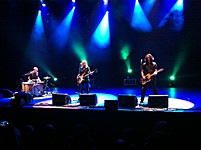 After an introduction in French, not my greatest skill, L'Enfance Rouge (a French-Italian combo) entered the stage. The first of many power trios. Guitar, bass, drums and vocals. Labelled avant-rock by the RIO organisers. 'Without boundaries, neither musical nor geographical. The European press talks about them as a crossroad between introversion and acceleration, between cerebralism and wildness or barbarity.' About right! They reminded me to some extent about the last incarnations of the mid 1970s King Crimson, mixed with some punk attitude and energy and a little bit of Jack White (White Stripes etc.) without the blues, thrown in for good measure. The band reached the climax towards the end when guitarist Francois R. Cambuzat fell off the stage, hurt his leg, but managed to continue playing.
After an introduction in French, not my greatest skill, L'Enfance Rouge (a French-Italian combo) entered the stage. The first of many power trios. Guitar, bass, drums and vocals. Labelled avant-rock by the RIO organisers. 'Without boundaries, neither musical nor geographical. The European press talks about them as a crossroad between introversion and acceleration, between cerebralism and wildness or barbarity.' About right! They reminded me to some extent about the last incarnations of the mid 1970s King Crimson, mixed with some punk attitude and energy and a little bit of Jack White (White Stripes etc.) without the blues, thrown in for good measure. The band reached the climax towards the end when guitarist Francois R. Cambuzat fell off the stage, hurt his leg, but managed to continue playing.
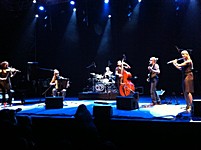 Next out was Belgian Aranis. Not your average rock'n'roll band. I had only heard one album by them in advance of the festival, a relaxed and sacral affair with classical instruments and quite a bit medieval madrigal kind of singing. The RIO performance took me by surprise and several others, too, it seems. It was more lively than expected, almost entirely instrumental. The line-up included, from left: grand piano, violin, accordeon, double bass, guitar and flute. The set mainly included compositions from the band's most recent album Made In Belgium (released last year; highly recommended, I know by now!), with music written by contemporary Belgian composers including Daniel Denis of Univers Zero, minimalist Wim Mertens (of Soft Verdict), Roger Trigaux of Present (the most complicated piece of them all and the last encore) and a few by Aranis' own bass player Joris Vanvinckenroye as well as a few others unknown to me. A great and entertaining mix of classical, chamber, minimalist, a little bit folk, avant garde, contemporary serious, experimental stuff, cabaret and Kurt Weil. Midway in, an old mate, Dave Kerman, the personified American RIO representative if ever there was one (of 5uu's, U Totem, Thinking Plague, Israelian Ahvak and Belgian Present to name a few), entered the stage, sat in on drums and gave an extra drive to the music. The funniest moment of the evening was when Dave kept the rhythms with his dusty sandals ... Aranis was one of the few bands of the entire RIO event that played encores and was without any doubt the highlight of the evening, maybe of the entire festival. They didn't use sheet music. Impressive! We walked out into the night in high spirits to breathe in and out for a while and had to visit the Aranis stall in the hallway afterwards to find out more about their back catalogue and a little chat. Next out was Belgian Aranis. Not your average rock'n'roll band. I had only heard one album by them in advance of the festival, a relaxed and sacral affair with classical instruments and quite a bit medieval madrigal kind of singing. The RIO performance took me by surprise and several others, too, it seems. It was more lively than expected, almost entirely instrumental. The line-up included, from left: grand piano, violin, accordeon, double bass, guitar and flute. The set mainly included compositions from the band's most recent album Made In Belgium (released last year; highly recommended, I know by now!), with music written by contemporary Belgian composers including Daniel Denis of Univers Zero, minimalist Wim Mertens (of Soft Verdict), Roger Trigaux of Present (the most complicated piece of them all and the last encore) and a few by Aranis' own bass player Joris Vanvinckenroye as well as a few others unknown to me. A great and entertaining mix of classical, chamber, minimalist, a little bit folk, avant garde, contemporary serious, experimental stuff, cabaret and Kurt Weil. Midway in, an old mate, Dave Kerman, the personified American RIO representative if ever there was one (of 5uu's, U Totem, Thinking Plague, Israelian Ahvak and Belgian Present to name a few), entered the stage, sat in on drums and gave an extra drive to the music. The funniest moment of the evening was when Dave kept the rhythms with his dusty sandals ... Aranis was one of the few bands of the entire RIO event that played encores and was without any doubt the highlight of the evening, maybe of the entire festival. They didn't use sheet music. Impressive! We walked out into the night in high spirits to breathe in and out for a while and had to visit the Aranis stall in the hallway afterwards to find out more about their back catalogue and a little chat.
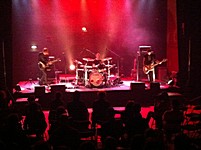 But the evening was still young. Time for French We Insist!. Another guitar, bass and drums power trio and more non-conform alternative rock. 'We Insist! is more than a rock band, it's a genuine musical project. They reject conformity and their music is impossible to pin-down: is it post-hardcore, noise, metal, independent rock, pop or experimental?' Play it loud!
But the evening was still young. Time for French We Insist!. Another guitar, bass and drums power trio and more non-conform alternative rock. 'We Insist! is more than a rock band, it's a genuine musical project. They reject conformity and their music is impossible to pin-down: is it post-hardcore, noise, metal, independent rock, pop or experimental?' Play it loud!
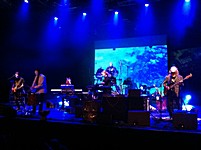 Faust was supposed to headline the first evening. Originally a German band, they now included two Frenchmen, one Belgian, one from Austria, one from Israel (and a British lady, maybe?), original member and mainly bassist Jean-Hervé Péron informed us towards the end of the gig. Faust is a strange beast. Occasionally a well organised and hypnotic experience, occasionally very disorganised, spontaneous and it seems to be a coincidence if it works or not. The band doesn't quite fit into the RIO bag. On the other hand, Faust was one of the first bands that was relaunched by Recommended Records soon after Chris Cutler had established his company. They had a great entry with masks, hypnotizing and mystic music. Soon the masks were taken off and they wandered into more ordinary terrain. The keyboard guy looked real spooky with a horse's head. When it came off, it turned out to be none other than Pierre Chevalier, the piano player of Aranis and ex-keyboard player of Univers Zero. To me Faust seemed to reach the most ordinary when they picked up the chainsaw, angle grinder and lit a fire in a metal pan. The sparks were not very entertaining and Peron didn't seem very passionate or enthralling during those sequences. It might have worked 40 years ago, but grew out of fashion by the mid 1980s.
But the most spectacular stage show of the entire festival was probably when they persuaded a woman from the audience to sit on the edge of the stage and knit... Impressive!
When they reached the last offering of the evening it was way past midnight, which meant it was the date for the 40 years anniversary of Faust IV. They celebrated the event with a version of "Krautrock". Unfortunately a disorganised and not very hypnotic version. Faust was supposed to headline the first evening. Originally a German band, they now included two Frenchmen, one Belgian, one from Austria, one from Israel (and a British lady, maybe?), original member and mainly bassist Jean-Hervé Péron informed us towards the end of the gig. Faust is a strange beast. Occasionally a well organised and hypnotic experience, occasionally very disorganised, spontaneous and it seems to be a coincidence if it works or not. The band doesn't quite fit into the RIO bag. On the other hand, Faust was one of the first bands that was relaunched by Recommended Records soon after Chris Cutler had established his company. They had a great entry with masks, hypnotizing and mystic music. Soon the masks were taken off and they wandered into more ordinary terrain. The keyboard guy looked real spooky with a horse's head. When it came off, it turned out to be none other than Pierre Chevalier, the piano player of Aranis and ex-keyboard player of Univers Zero. To me Faust seemed to reach the most ordinary when they picked up the chainsaw, angle grinder and lit a fire in a metal pan. The sparks were not very entertaining and Peron didn't seem very passionate or enthralling during those sequences. It might have worked 40 years ago, but grew out of fashion by the mid 1980s.
But the most spectacular stage show of the entire festival was probably when they persuaded a woman from the audience to sit on the edge of the stage and knit... Impressive!
When they reached the last offering of the evening it was way past midnight, which meant it was the date for the 40 years anniversary of Faust IV. They celebrated the event with a version of "Krautrock". Unfortunately a disorganised and not very hypnotic version.
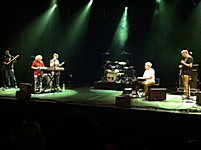 It was way beyond bedtime for middle aged men when we reached our hotel rooms. Managed a short tourist break and a late breakfast the following morning before it was time to move over to the festival site. Enter the quitet Cheer-Accident from Chicago, Illinois, USA. From dreamy pop to angular art-rock, Cheer-Accident strikes a powerful balance between personalized and unique studio wizardry and the visceral excitement of a well-honed, explosive live rock band'. We had met young Norwegian Alexander at the bus back to town the previous night, and C-A was the act of the festival he had highest hopes for. I had only heard one of their albums prior to the event, which was an uneven experience; a rollercoaster ride of highs and lows. And the same goes for the RIO concert. Occasionally intense and exhilarating, others uninspired, if you ask me. They knew their King Crimson song book, so to speak, as with several of the other acts present. More so than the books of the original RIO bands. With two keyboard players up front and a drummer that left his stool occasionally to play the trumpet, sing along with the female main vocalist/keyboard player or chat with the audience, they managed to separate from from most of the other bands. Definitely a band to delve deeper into. It was way beyond bedtime for middle aged men when we reached our hotel rooms. Managed a short tourist break and a late breakfast the following morning before it was time to move over to the festival site. Enter the quitet Cheer-Accident from Chicago, Illinois, USA. From dreamy pop to angular art-rock, Cheer-Accident strikes a powerful balance between personalized and unique studio wizardry and the visceral excitement of a well-honed, explosive live rock band'. We had met young Norwegian Alexander at the bus back to town the previous night, and C-A was the act of the festival he had highest hopes for. I had only heard one of their albums prior to the event, which was an uneven experience; a rollercoaster ride of highs and lows. And the same goes for the RIO concert. Occasionally intense and exhilarating, others uninspired, if you ask me. They knew their King Crimson song book, so to speak, as with several of the other acts present. More so than the books of the original RIO bands. With two keyboard players up front and a drummer that left his stool occasionally to play the trumpet, sing along with the female main vocalist/keyboard player or chat with the audience, they managed to separate from from most of the other bands. Definitely a band to delve deeper into.
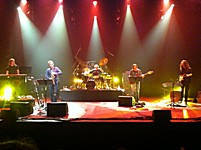 Chamber-rock ensemble Univers Zero was next up; the only original RIO-group of the festival. It's been one of my all time favourite bands of the progressive genre since I discovered their third album in the early 1980s. The band's only visit to Norway was around that time, but I lived far away from Oslo then... Now, 30 years on, finally! Drummer and band leader/owner Daniel Denis arrived with yet a new line-up. Gone was long time member Michel Berckmans (bassoon, oboe and French horn), alas. Nothing wrong with the relatively new reed guy, Kurt Budé, especially his bass saxophone was fascinating, but I did indeed miss Michel's bassoon. Only Denis, Budé and relatively new bass player Dimitry Evers was left from the line-up that recorded UZ's most recent studio album Clivages. Guitar player and Steve Hillage of the 1970s lookalike Nicolas Dechêne and keyboardist Antoine Guenet were newcomers. Another disappointment was the lack of a violin player. Distorted bass and keyboards, a close to funky bass solo and only new compositions didn't do matters better. But in between they gained that vibe that only Univers Zero posesses; doom & gloom, spine chilling and magic ... It seemed Daniel Denis had mixed feelings about the effort afterwards. This was only this line-up's fourth gig and they didn't seem to be as rehearsed as this kind of music demands. Still it was a great effort by his relatively new and young band mates. This was the only band of the festival that didn't live up to my expectations. But I'm immensely satisfied that I got a close encounter with this unique ensemble at last. Chamber-rock ensemble Univers Zero was next up; the only original RIO-group of the festival. It's been one of my all time favourite bands of the progressive genre since I discovered their third album in the early 1980s. The band's only visit to Norway was around that time, but I lived far away from Oslo then... Now, 30 years on, finally! Drummer and band leader/owner Daniel Denis arrived with yet a new line-up. Gone was long time member Michel Berckmans (bassoon, oboe and French horn), alas. Nothing wrong with the relatively new reed guy, Kurt Budé, especially his bass saxophone was fascinating, but I did indeed miss Michel's bassoon. Only Denis, Budé and relatively new bass player Dimitry Evers was left from the line-up that recorded UZ's most recent studio album Clivages. Guitar player and Steve Hillage of the 1970s lookalike Nicolas Dechêne and keyboardist Antoine Guenet were newcomers. Another disappointment was the lack of a violin player. Distorted bass and keyboards, a close to funky bass solo and only new compositions didn't do matters better. But in between they gained that vibe that only Univers Zero posesses; doom & gloom, spine chilling and magic ... It seemed Daniel Denis had mixed feelings about the effort afterwards. This was only this line-up's fourth gig and they didn't seem to be as rehearsed as this kind of music demands. Still it was a great effort by his relatively new and young band mates. This was the only band of the festival that didn't live up to my expectations. But I'm immensely satisfied that I got a close encounter with this unique ensemble at last.
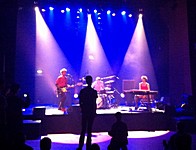 Time for the merriest men of the festival. The three cheerful boys of French PoiL entered the stage from the front, running among the audience at first, with their becoming red old-fashioned swim suits. A different power trio with organ, bass, drums, quite a lot singing, shouting and jumping. They started in a hilarious tempo and continued in a hilarious tempo. With the mixed-in humour they seem to some extent inspired by old uncle Frank Z., the French RIO artist Albert Marcæur and original RIO band Samla Mammas Manna, methinks. The boys seemed to have a lot of fun and were impressively precise. Another highlight. Look out for hiarious PoiL videos on the net and a new album, soon around the corner. Time for the merriest men of the festival. The three cheerful boys of French PoiL entered the stage from the front, running among the audience at first, with their becoming red old-fashioned swim suits. A different power trio with organ, bass, drums, quite a lot singing, shouting and jumping. They started in a hilarious tempo and continued in a hilarious tempo. With the mixed-in humour they seem to some extent inspired by old uncle Frank Z., the French RIO artist Albert Marcæur and original RIO band Samla Mammas Manna, methinks. The boys seemed to have a lot of fun and were impressively precise. Another highlight. Look out for hiarious PoiL videos on the net and a new album, soon around the corner.
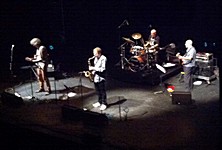 I was sure the inclusion of Soft Machine on the bill was a hoax. It ought to have been Soft Machine Legacy. Well, as far as I recon, it was the latest Soft Machine Legacy line-up that entered the stage, i.e. John Etheridge (guitar), Roy Babbington (bass), John Marshall drums and Theo Travis (sax and flute). But they played old Soft Machine numbers, so I guess the name might have been deliberate after all. Soft Machine belongs to my dearest musical favourites, but only at the start as British psychedelic pioneers around 1967-69 and jazz-rock dittos around 1969-70. Later the band developed into pure jazz and fusion and more concerned with technique than feelings as far as I am concerned. Three of the musicians we are dealing with here, were involved in latterday Softs of the mid and late 1970s, some years after the charm and wits of Daevid Allen, Kevin Ayers and Robert Wyatt had worn off. Theo Travis is too young to have been involved in the original band, but has played with Daevid Allen in Gong, Robert Fripp, Porcupine Tree, Steven Wilson and David Sylvian to name but a few. He joined the Legacy after Elton Dean passed away in 2006. As long as Theo played the sax it sounded too jazzy for my liking, but improved a lot when he picked up his flute. A lot mellower and more lyrical at once. Among the latter was a beautiful version of Hugh Hopper's "Kings And Queens" from Soft Machine's Fourth (there's also a version on Soft Machine Legacy's latest offering). The funniest moment was during a break with technical problems when a dog took a stroll around the stage and went out again at the back, the same way it came in. I left the premises during the inevitable drum solo, the most tedious of music related activities. I was sure the inclusion of Soft Machine on the bill was a hoax. It ought to have been Soft Machine Legacy. Well, as far as I recon, it was the latest Soft Machine Legacy line-up that entered the stage, i.e. John Etheridge (guitar), Roy Babbington (bass), John Marshall drums and Theo Travis (sax and flute). But they played old Soft Machine numbers, so I guess the name might have been deliberate after all. Soft Machine belongs to my dearest musical favourites, but only at the start as British psychedelic pioneers around 1967-69 and jazz-rock dittos around 1969-70. Later the band developed into pure jazz and fusion and more concerned with technique than feelings as far as I am concerned. Three of the musicians we are dealing with here, were involved in latterday Softs of the mid and late 1970s, some years after the charm and wits of Daevid Allen, Kevin Ayers and Robert Wyatt had worn off. Theo Travis is too young to have been involved in the original band, but has played with Daevid Allen in Gong, Robert Fripp, Porcupine Tree, Steven Wilson and David Sylvian to name but a few. He joined the Legacy after Elton Dean passed away in 2006. As long as Theo played the sax it sounded too jazzy for my liking, but improved a lot when he picked up his flute. A lot mellower and more lyrical at once. Among the latter was a beautiful version of Hugh Hopper's "Kings And Queens" from Soft Machine's Fourth (there's also a version on Soft Machine Legacy's latest offering). The funniest moment was during a break with technical problems when a dog took a stroll around the stage and went out again at the back, the same way it came in. I left the premises during the inevitable drum solo, the most tedious of music related activities.
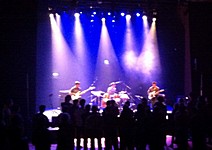 Japanese Korekyojinn was next. Another guitar, bass and drums power trio. They are 'a progressive-jazz-rock band determined to redefine the polyrhythmic ensemble. The band's name translates to This Giant, a sly pun inspired by This Heat and Gentle Giant, two band's the group draws inspiration from.' Well, I didn't notic any obvious similarities with the two named bands. Korekyojinn played furiously fast and precise and to me it was all about technique and nothing else. Very impressive to watch, but the music only reached the head, not the heart. The guitarist used sheet music. He was obviously able to read impressively fast as well... Japanese Korekyojinn was next. Another guitar, bass and drums power trio. They are 'a progressive-jazz-rock band determined to redefine the polyrhythmic ensemble. The band's name translates to This Giant, a sly pun inspired by This Heat and Gentle Giant, two band's the group draws inspiration from.' Well, I didn't notic any obvious similarities with the two named bands. Korekyojinn played furiously fast and precise and to me it was all about technique and nothing else. Very impressive to watch, but the music only reached the head, not the heart. The guitarist used sheet music. He was obviously able to read impressively fast as well...
The two middle aged Norwegians were exhausted. Lack of sleep and too much great music too soon had taken its toll and we had to throw in the towel before the last act of the evening. Which meant we missed out on miRthkon from the US that of course was a pity. Described as 'an amplified chamber ensemble masquerading as a rock band. This illusion is well maintained by the fact that from time to time they do, indeed, rock. ... Maintaining a passionate aesthetic stance that they are (quite happily) 'beneath everything', their music - whether evoking the direct or indirect influence of progressive rock, contemporary classical abstraction, avant-garde jazz, catchy hook-laden pop, or thrash metal - is held to a simple but firm standard: Does it sound good?' There were two reed blowers with devils' horns, I've seen on photos later.
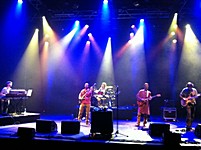 After a good and quite long night's sleep it was time for some nice sight-seeing in the old town of Albi, that was added to the UNESCO World Heritage Sites list in 2010, the following morning before it was time to move over to the festival terrain. Senogul, a quintet from Spain, was the first band out. I hadn't heard any of their recordings in advance, but they seemed very concerned with classic progressive rock of the 1970s. Too much, if you ask me; they seemed to want to include too many classical progressive elements into each composition, with the result that they didn't seem quite cohesive. They also used a lot of exotic instruments, but more as an effect than being incorporated as a natural part of the music. Occasionally it worked real well, though and rumours say some of the Senogul recordings work better and are well worth checking out. After a good and quite long night's sleep it was time for some nice sight-seeing in the old town of Albi, that was added to the UNESCO World Heritage Sites list in 2010, the following morning before it was time to move over to the festival terrain. Senogul, a quintet from Spain, was the first band out. I hadn't heard any of their recordings in advance, but they seemed very concerned with classic progressive rock of the 1970s. Too much, if you ask me; they seemed to want to include too many classical progressive elements into each composition, with the result that they didn't seem quite cohesive. They also used a lot of exotic instruments, but more as an effect than being incorporated as a natural part of the music. Occasionally it worked real well, though and rumours say some of the Senogul recordings work better and are well worth checking out.
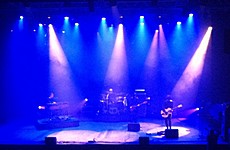 Time for one more of the groups we had highest expectations in. Guapo is a British instrumental quartet 'that plays an intense, emotive and sometimes harrowing music that straddles the boundaries of progressive, noise, minimalism and avant-rock'. They didn't disappoint. The set was of a dense, loud and quite overwhelming kind that I'd never experienced with any other band live earlier. My earplugs were forced further into the auditory canals due to the sheer volume so I guess I missed some of the treble of Guapo's mighty sound. Anyway it worked real well. The band fulfilled the all expectations. Another highlight. Time for one more of the groups we had highest expectations in. Guapo is a British instrumental quartet 'that plays an intense, emotive and sometimes harrowing music that straddles the boundaries of progressive, noise, minimalism and avant-rock'. They didn't disappoint. The set was of a dense, loud and quite overwhelming kind that I'd never experienced with any other band live earlier. My earplugs were forced further into the auditory canals due to the sheer volume so I guess I missed some of the treble of Guapo's mighty sound. Anyway it worked real well. The band fulfilled the all expectations. Another highlight.
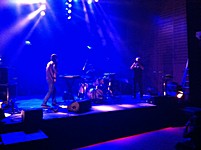 It couldn't be easy to follow a mighty beast like Guapo, and French Nullstellensatz had problems to grab at least my full attention. The band is a trio, though not of the powerful kind. Instead they're dealing with relatively free and experimental jazz and with a unique, I guess, line-up of guitar/synth, trumpet and drums/synth/electronics. Some original and unique soundscapes in between. The trumpeter seemed to be twice the age of the two other musicians. It couldn't be easy to follow a mighty beast like Guapo, and French Nullstellensatz had problems to grab at least my full attention. The band is a trio, though not of the powerful kind. Instead they're dealing with relatively free and experimental jazz and with a unique, I guess, line-up of guitar/synth, trumpet and drums/synth/electronics. Some original and unique soundscapes in between. The trumpeter seemed to be twice the age of the two other musicians.
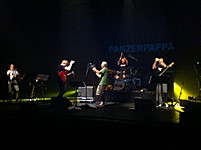 Time for the home favourites. Norwegian Panzerpappa is one of the groups I've witnessed live most frequently during the last 15 years or so. Still, I've only managed to cover one of their five albums here at Luna Kafé. Surely a shame! Described as 'the definitive Norwegian instrumental avant/progressive rock/RIO group. Their inventive and playful sound ("progressive rock with a friendly face") is at once reminiscent of inspirational precursors such as Samla Mammas Manna, King Crimson, Henry Cow, Univers Zero and Frank Zappa, while at the same time sounding unmistakably like ... Panzerpappa!' To me Panzerpappa has a more lightweight sound than some of the bands mentioned above. Canterbury Scene bands such as Soft Machine (anno 1969/70) and Hatfield & The North seem like more obvious influences than some of the ones mentioned above. Not only because the Panzerpappa members have played with Richard Sinclair on a few occasions. Their music might sound quirky to some, but especially live they have a lot of charm that makes it easier to get into their music. They charmed the French and international audience as well, both with the mainly instrumental music and trying to translate and explain the funny and double bottom Norwegian song titles in between. Relatively new member Hans-Petter Alfredsen entered the front of the stage for some hushed down vocals once but mainly stayed behind his keyboard. The band seemed to be in trouble when guitarist Jarle Storløkken spilled most of his volominous sheet music on the floor. He had to bend his knees even more than usual, but managed to cope with it. Jarle also welcomed an old friend and guest dusty sandal percussion player midway though the set, none other than Dave Kerman. Hilarious once more! I think Panzerpappa played numbers off all albums except the debut and all of them went down very well. Even the Swede at the second row shouted a Hooray for Norway! once! The boys were happy and satisfied and along with their girlfriends were very busy at the Panzerpappa stall afterwards. You can watch the entire set at their Facebook page. Time for the home favourites. Norwegian Panzerpappa is one of the groups I've witnessed live most frequently during the last 15 years or so. Still, I've only managed to cover one of their five albums here at Luna Kafé. Surely a shame! Described as 'the definitive Norwegian instrumental avant/progressive rock/RIO group. Their inventive and playful sound ("progressive rock with a friendly face") is at once reminiscent of inspirational precursors such as Samla Mammas Manna, King Crimson, Henry Cow, Univers Zero and Frank Zappa, while at the same time sounding unmistakably like ... Panzerpappa!' To me Panzerpappa has a more lightweight sound than some of the bands mentioned above. Canterbury Scene bands such as Soft Machine (anno 1969/70) and Hatfield & The North seem like more obvious influences than some of the ones mentioned above. Not only because the Panzerpappa members have played with Richard Sinclair on a few occasions. Their music might sound quirky to some, but especially live they have a lot of charm that makes it easier to get into their music. They charmed the French and international audience as well, both with the mainly instrumental music and trying to translate and explain the funny and double bottom Norwegian song titles in between. Relatively new member Hans-Petter Alfredsen entered the front of the stage for some hushed down vocals once but mainly stayed behind his keyboard. The band seemed to be in trouble when guitarist Jarle Storløkken spilled most of his volominous sheet music on the floor. He had to bend his knees even more than usual, but managed to cope with it. Jarle also welcomed an old friend and guest dusty sandal percussion player midway though the set, none other than Dave Kerman. Hilarious once more! I think Panzerpappa played numbers off all albums except the debut and all of them went down very well. Even the Swede at the second row shouted a Hooray for Norway! once! The boys were happy and satisfied and along with their girlfriends were very busy at the Panzerpappa stall afterwards. You can watch the entire set at their Facebook page.
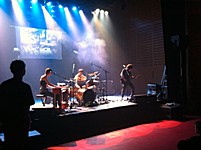 Ulan Bator started as a French duo twenty years ago. The band might be labelled experimental rock and have collaborated with Faust and Michael Gira of Swans to name but two, has released around 10 albums and seem to have evolved into an international combo. By now a trio that include guitar, organ, drums and vocals. They sounded less powerful than the previous power trios of the festival and was less experimental/improvisational compared to Nullstellensatz. Interesting sound and songs and I decided to check out their recorded output later on. During the gig I wasn't quite able to concentrate, having troubles to come quite down after the Panzerpappa performance and in expectation of what was to come with the next and final act of the festival. Ulan Bator started as a French duo twenty years ago. The band might be labelled experimental rock and have collaborated with Faust and Michael Gira of Swans to name but two, has released around 10 albums and seem to have evolved into an international combo. By now a trio that include guitar, organ, drums and vocals. They sounded less powerful than the previous power trios of the festival and was less experimental/improvisational compared to Nullstellensatz. Interesting sound and songs and I decided to check out their recorded output later on. During the gig I wasn't quite able to concentrate, having troubles to come quite down after the Panzerpappa performance and in expectation of what was to come with the next and final act of the festival.
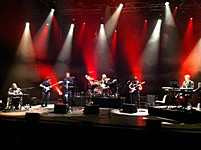 We had high hopes for Present, and not without reason. The Belgian band was started by guitarist Roger Trigaux around 1979 when he left Univers Zero, came to an end in the early 1980s after two albums, resurrected in the early 1990s and has kept going since then with a flucuating line-up centered around Roger and his son, guitarist and vocalist Réginald. In addition drummer Dave Kerman (yes, him again!) has been aboard for several years, as well, while reed player Kurt Budé (yes, the one from Univers Zero the previous day) and keyboardist Pierre Chevalier (yes, the one from Aranis and Faust two evenings earlier) must be counted as relatively newcomers. Roger Trigaux is struck by illness and sat in a wheelchair. He couldn't play his guitar anymore, only introduced the numbers and played a little bit keyboards but seemed to be in control of his fellow musicians. Réginald took care of most of the vocals apart from a guest appearance by Guapo's guitarist Kavus Torabi.
I hadn't managed to trace Present's latest album Barbaro (Ma Non Troppo) before the festival, and not after either. Apart from the classic "Promenade Au Fond D'un Canal" originally from the debut album, I guess they might have played compositions off Barbaro or new ones by Roger. It was dense, strict, demanding and rewarding. The set was good, it was great, it was stunning! We were quite exhausted afterwards and fully agreed that Present's performance reached top of the bill. We had high hopes for Present, and not without reason. The Belgian band was started by guitarist Roger Trigaux around 1979 when he left Univers Zero, came to an end in the early 1980s after two albums, resurrected in the early 1990s and has kept going since then with a flucuating line-up centered around Roger and his son, guitarist and vocalist Réginald. In addition drummer Dave Kerman (yes, him again!) has been aboard for several years, as well, while reed player Kurt Budé (yes, the one from Univers Zero the previous day) and keyboardist Pierre Chevalier (yes, the one from Aranis and Faust two evenings earlier) must be counted as relatively newcomers. Roger Trigaux is struck by illness and sat in a wheelchair. He couldn't play his guitar anymore, only introduced the numbers and played a little bit keyboards but seemed to be in control of his fellow musicians. Réginald took care of most of the vocals apart from a guest appearance by Guapo's guitarist Kavus Torabi.
I hadn't managed to trace Present's latest album Barbaro (Ma Non Troppo) before the festival, and not after either. Apart from the classic "Promenade Au Fond D'un Canal" originally from the debut album, I guess they might have played compositions off Barbaro or new ones by Roger. It was dense, strict, demanding and rewarding. The set was good, it was great, it was stunning! We were quite exhausted afterwards and fully agreed that Present's performance reached top of the bill.
Time to say goodbye. This is a small festival, I don't think there could've been more than 500 or 600 persons around in all including the musicians and arrangers. There were people present from all over western Europe, USA, Canada, Israel and Japan. Several seemed to be returning to the festival each year and some of the most hard-core among them met up at progressive fests in USA as well. We only had about three hours of sleep before we had to leave to reach the plane back home. Quite exhausted and full of impressions, we had to agree that the 4 or 5 greatest highlights alone were worth the trip. And most of the others were also well worth to indulge deeper into.
Copyright © 2013 JP 
|

 After an introduction in French, not my greatest skill, L'Enfance Rouge (a French-Italian combo) entered the stage. The first of many power trios. Guitar, bass, drums and vocals. Labelled avant-rock by the RIO organisers. 'Without boundaries, neither musical nor geographical. The European press talks about them as a crossroad between introversion and acceleration, between cerebralism and wildness or barbarity.' About right! They reminded me to some extent about the last incarnations of the mid 1970s King Crimson, mixed with some punk attitude and energy and a little bit of Jack White (White Stripes etc.) without the blues, thrown in for good measure. The band reached the climax towards the end when guitarist Francois R. Cambuzat fell off the stage, hurt his leg, but managed to continue playing.
After an introduction in French, not my greatest skill, L'Enfance Rouge (a French-Italian combo) entered the stage. The first of many power trios. Guitar, bass, drums and vocals. Labelled avant-rock by the RIO organisers. 'Without boundaries, neither musical nor geographical. The European press talks about them as a crossroad between introversion and acceleration, between cerebralism and wildness or barbarity.' About right! They reminded me to some extent about the last incarnations of the mid 1970s King Crimson, mixed with some punk attitude and energy and a little bit of Jack White (White Stripes etc.) without the blues, thrown in for good measure. The band reached the climax towards the end when guitarist Francois R. Cambuzat fell off the stage, hurt his leg, but managed to continue playing. Next out was Belgian Aranis. Not your average rock'n'roll band. I had only heard one album by them in advance of the festival, a relaxed and sacral affair with classical instruments and quite a bit medieval madrigal kind of singing. The RIO performance took me by surprise and several others, too, it seems. It was more lively than expected, almost entirely instrumental. The line-up included, from left: grand piano, violin, accordeon, double bass, guitar and flute. The set mainly included compositions from the band's most recent album Made In Belgium (released last year; highly recommended, I know by now!), with music written by contemporary Belgian composers including Daniel Denis of Univers Zero, minimalist Wim Mertens (of Soft Verdict), Roger Trigaux of Present (the most complicated piece of them all and the last encore) and a few by Aranis' own bass player Joris Vanvinckenroye as well as a few others unknown to me. A great and entertaining mix of classical, chamber, minimalist, a little bit folk, avant garde, contemporary serious, experimental stuff, cabaret and Kurt Weil. Midway in, an old mate, Dave Kerman, the personified American RIO representative if ever there was one (of 5uu's, U Totem, Thinking Plague, Israelian Ahvak and Belgian Present to name a few), entered the stage, sat in on drums and gave an extra drive to the music. The funniest moment of the evening was when Dave kept the rhythms with his dusty sandals ... Aranis was one of the few bands of the entire RIO event that played encores and was without any doubt the highlight of the evening, maybe of the entire festival. They didn't use sheet music. Impressive! We walked out into the night in high spirits to breathe in and out for a while and had to visit the Aranis stall in the hallway afterwards to find out more about their back catalogue and a little chat.
Next out was Belgian Aranis. Not your average rock'n'roll band. I had only heard one album by them in advance of the festival, a relaxed and sacral affair with classical instruments and quite a bit medieval madrigal kind of singing. The RIO performance took me by surprise and several others, too, it seems. It was more lively than expected, almost entirely instrumental. The line-up included, from left: grand piano, violin, accordeon, double bass, guitar and flute. The set mainly included compositions from the band's most recent album Made In Belgium (released last year; highly recommended, I know by now!), with music written by contemporary Belgian composers including Daniel Denis of Univers Zero, minimalist Wim Mertens (of Soft Verdict), Roger Trigaux of Present (the most complicated piece of them all and the last encore) and a few by Aranis' own bass player Joris Vanvinckenroye as well as a few others unknown to me. A great and entertaining mix of classical, chamber, minimalist, a little bit folk, avant garde, contemporary serious, experimental stuff, cabaret and Kurt Weil. Midway in, an old mate, Dave Kerman, the personified American RIO representative if ever there was one (of 5uu's, U Totem, Thinking Plague, Israelian Ahvak and Belgian Present to name a few), entered the stage, sat in on drums and gave an extra drive to the music. The funniest moment of the evening was when Dave kept the rhythms with his dusty sandals ... Aranis was one of the few bands of the entire RIO event that played encores and was without any doubt the highlight of the evening, maybe of the entire festival. They didn't use sheet music. Impressive! We walked out into the night in high spirits to breathe in and out for a while and had to visit the Aranis stall in the hallway afterwards to find out more about their back catalogue and a little chat. But the evening was still young. Time for French We Insist!. Another guitar, bass and drums power trio and more non-conform alternative rock. 'We Insist! is more than a rock band, it's a genuine musical project. They reject conformity and their music is impossible to pin-down: is it post-hardcore, noise, metal, independent rock, pop or experimental?' Play it loud!
But the evening was still young. Time for French We Insist!. Another guitar, bass and drums power trio and more non-conform alternative rock. 'We Insist! is more than a rock band, it's a genuine musical project. They reject conformity and their music is impossible to pin-down: is it post-hardcore, noise, metal, independent rock, pop or experimental?' Play it loud! Faust was supposed to headline the first evening. Originally a German band, they now included two Frenchmen, one Belgian, one from Austria, one from Israel (and a British lady, maybe?), original member and mainly bassist Jean-Hervé Péron informed us towards the end of the gig. Faust is a strange beast. Occasionally a well organised and hypnotic experience, occasionally very disorganised, spontaneous and it seems to be a coincidence if it works or not. The band doesn't quite fit into the RIO bag. On the other hand, Faust was one of the first bands that was relaunched by Recommended Records soon after Chris Cutler had established his company. They had a great entry with masks, hypnotizing and mystic music. Soon the masks were taken off and they wandered into more ordinary terrain. The keyboard guy looked real spooky with a horse's head. When it came off, it turned out to be none other than Pierre Chevalier, the piano player of Aranis and ex-keyboard player of Univers Zero. To me Faust seemed to reach the most ordinary when they picked up the chainsaw, angle grinder and lit a fire in a metal pan. The sparks were not very entertaining and Peron didn't seem very passionate or enthralling during those sequences. It might have worked 40 years ago, but grew out of fashion by the mid 1980s.
But the most spectacular stage show of the entire festival was probably when they persuaded a woman from the audience to sit on the edge of the stage and knit... Impressive!
When they reached the last offering of the evening it was way past midnight, which meant it was the date for the 40 years anniversary of
Faust was supposed to headline the first evening. Originally a German band, they now included two Frenchmen, one Belgian, one from Austria, one from Israel (and a British lady, maybe?), original member and mainly bassist Jean-Hervé Péron informed us towards the end of the gig. Faust is a strange beast. Occasionally a well organised and hypnotic experience, occasionally very disorganised, spontaneous and it seems to be a coincidence if it works or not. The band doesn't quite fit into the RIO bag. On the other hand, Faust was one of the first bands that was relaunched by Recommended Records soon after Chris Cutler had established his company. They had a great entry with masks, hypnotizing and mystic music. Soon the masks were taken off and they wandered into more ordinary terrain. The keyboard guy looked real spooky with a horse's head. When it came off, it turned out to be none other than Pierre Chevalier, the piano player of Aranis and ex-keyboard player of Univers Zero. To me Faust seemed to reach the most ordinary when they picked up the chainsaw, angle grinder and lit a fire in a metal pan. The sparks were not very entertaining and Peron didn't seem very passionate or enthralling during those sequences. It might have worked 40 years ago, but grew out of fashion by the mid 1980s.
But the most spectacular stage show of the entire festival was probably when they persuaded a woman from the audience to sit on the edge of the stage and knit... Impressive!
When they reached the last offering of the evening it was way past midnight, which meant it was the date for the 40 years anniversary of  It was way beyond bedtime for middle aged men when we reached our hotel rooms. Managed a short tourist break and a late breakfast the following morning before it was time to move over to the festival site. Enter the quitet Cheer-Accident from Chicago, Illinois, USA. From dreamy pop to angular art-rock, Cheer-Accident strikes a powerful balance between personalized and unique studio wizardry and the visceral excitement of a well-honed, explosive live rock band'. We had met young Norwegian Alexander at the bus back to town the previous night, and C-A was the act of the festival he had highest hopes for. I had only heard one of their albums prior to the event, which was an uneven experience; a rollercoaster ride of highs and lows. And the same goes for the RIO concert. Occasionally intense and exhilarating, others uninspired, if you ask me. They knew their King Crimson song book, so to speak, as with several of the other acts present. More so than the books of the original RIO bands. With two keyboard players up front and a drummer that left his stool occasionally to play the trumpet, sing along with the female main vocalist/keyboard player or chat with the audience, they managed to separate from from most of the other bands. Definitely a band to delve deeper into.
It was way beyond bedtime for middle aged men when we reached our hotel rooms. Managed a short tourist break and a late breakfast the following morning before it was time to move over to the festival site. Enter the quitet Cheer-Accident from Chicago, Illinois, USA. From dreamy pop to angular art-rock, Cheer-Accident strikes a powerful balance between personalized and unique studio wizardry and the visceral excitement of a well-honed, explosive live rock band'. We had met young Norwegian Alexander at the bus back to town the previous night, and C-A was the act of the festival he had highest hopes for. I had only heard one of their albums prior to the event, which was an uneven experience; a rollercoaster ride of highs and lows. And the same goes for the RIO concert. Occasionally intense and exhilarating, others uninspired, if you ask me. They knew their King Crimson song book, so to speak, as with several of the other acts present. More so than the books of the original RIO bands. With two keyboard players up front and a drummer that left his stool occasionally to play the trumpet, sing along with the female main vocalist/keyboard player or chat with the audience, they managed to separate from from most of the other bands. Definitely a band to delve deeper into. Chamber-rock ensemble Univers Zero was next up; the only original RIO-group of the festival. It's been one of my all time favourite bands of the progressive genre since I discovered their third album in the early 1980s. The band's only visit to Norway was around that time, but I lived far away from Oslo then... Now, 30 years on, finally! Drummer and band leader/owner Daniel Denis arrived with yet a new line-up. Gone was long time member Michel Berckmans (bassoon, oboe and French horn), alas. Nothing wrong with the relatively new reed guy, Kurt Budé, especially his bass saxophone was fascinating, but I did indeed miss Michel's bassoon. Only Denis, Budé and relatively new bass player Dimitry Evers was left from the line-up that recorded UZ's most recent studio album
Chamber-rock ensemble Univers Zero was next up; the only original RIO-group of the festival. It's been one of my all time favourite bands of the progressive genre since I discovered their third album in the early 1980s. The band's only visit to Norway was around that time, but I lived far away from Oslo then... Now, 30 years on, finally! Drummer and band leader/owner Daniel Denis arrived with yet a new line-up. Gone was long time member Michel Berckmans (bassoon, oboe and French horn), alas. Nothing wrong with the relatively new reed guy, Kurt Budé, especially his bass saxophone was fascinating, but I did indeed miss Michel's bassoon. Only Denis, Budé and relatively new bass player Dimitry Evers was left from the line-up that recorded UZ's most recent studio album  Time for the merriest men of the festival. The three cheerful boys of French PoiL entered the stage from the front, running among the audience at first, with their becoming red old-fashioned swim suits. A different power trio with organ, bass, drums, quite a lot singing, shouting and jumping. They started in a hilarious tempo and continued in a hilarious tempo. With the mixed-in humour they seem to some extent inspired by old uncle Frank Z., the French RIO artist Albert Marcæur and original RIO band Samla Mammas Manna, methinks. The boys seemed to have a lot of fun and were impressively precise. Another highlight. Look out for hiarious PoiL videos on the net and a new album, soon around the corner.
Time for the merriest men of the festival. The three cheerful boys of French PoiL entered the stage from the front, running among the audience at first, with their becoming red old-fashioned swim suits. A different power trio with organ, bass, drums, quite a lot singing, shouting and jumping. They started in a hilarious tempo and continued in a hilarious tempo. With the mixed-in humour they seem to some extent inspired by old uncle Frank Z., the French RIO artist Albert Marcæur and original RIO band Samla Mammas Manna, methinks. The boys seemed to have a lot of fun and were impressively precise. Another highlight. Look out for hiarious PoiL videos on the net and a new album, soon around the corner. I was sure the inclusion of Soft Machine on the bill was a hoax. It ought to have been Soft Machine Legacy. Well, as far as I recon, it was the latest Soft Machine Legacy line-up that entered the stage, i.e. John Etheridge (guitar), Roy Babbington (bass), John Marshall drums and Theo Travis (sax and flute). But they played old Soft Machine numbers, so I guess the name might have been deliberate after all. Soft Machine belongs to my dearest musical favourites, but only at the start as British psychedelic pioneers around 1967-69 and jazz-rock dittos around 1969-70. Later the band developed into pure jazz and fusion and more concerned with technique than feelings as far as I am concerned. Three of the musicians we are dealing with here, were involved in latterday Softs of the mid and late 1970s, some years after the charm and wits of Daevid Allen, Kevin Ayers and Robert Wyatt had worn off. Theo Travis is too young to have been involved in the original band, but has played with Daevid Allen in Gong, Robert Fripp, Porcupine Tree, Steven Wilson and David Sylvian to name but a few. He joined the Legacy after Elton Dean passed away in 2006. As long as Theo played the sax it sounded too jazzy for my liking, but improved a lot when he picked up his flute. A lot mellower and more lyrical at once. Among the latter was a beautiful version of Hugh Hopper's "Kings And Queens" from Soft Machine's Fourth (there's also a version on Soft Machine Legacy's latest offering). The funniest moment was during a break with technical problems when a dog took a stroll around the stage and went out again at the back, the same way it came in. I left the premises during the inevitable drum solo, the most tedious of music related activities.
I was sure the inclusion of Soft Machine on the bill was a hoax. It ought to have been Soft Machine Legacy. Well, as far as I recon, it was the latest Soft Machine Legacy line-up that entered the stage, i.e. John Etheridge (guitar), Roy Babbington (bass), John Marshall drums and Theo Travis (sax and flute). But they played old Soft Machine numbers, so I guess the name might have been deliberate after all. Soft Machine belongs to my dearest musical favourites, but only at the start as British psychedelic pioneers around 1967-69 and jazz-rock dittos around 1969-70. Later the band developed into pure jazz and fusion and more concerned with technique than feelings as far as I am concerned. Three of the musicians we are dealing with here, were involved in latterday Softs of the mid and late 1970s, some years after the charm and wits of Daevid Allen, Kevin Ayers and Robert Wyatt had worn off. Theo Travis is too young to have been involved in the original band, but has played with Daevid Allen in Gong, Robert Fripp, Porcupine Tree, Steven Wilson and David Sylvian to name but a few. He joined the Legacy after Elton Dean passed away in 2006. As long as Theo played the sax it sounded too jazzy for my liking, but improved a lot when he picked up his flute. A lot mellower and more lyrical at once. Among the latter was a beautiful version of Hugh Hopper's "Kings And Queens" from Soft Machine's Fourth (there's also a version on Soft Machine Legacy's latest offering). The funniest moment was during a break with technical problems when a dog took a stroll around the stage and went out again at the back, the same way it came in. I left the premises during the inevitable drum solo, the most tedious of music related activities. Japanese Korekyojinn was next. Another guitar, bass and drums power trio. They are 'a progressive-jazz-rock band determined to redefine the polyrhythmic ensemble. The band's name translates to This Giant, a sly pun inspired by This Heat and Gentle Giant, two band's the group draws inspiration from.' Well, I didn't notic any obvious similarities with the two named bands. Korekyojinn played furiously fast and precise and to me it was all about technique and nothing else. Very impressive to watch, but the music only reached the head, not the heart. The guitarist used sheet music. He was obviously able to read impressively fast as well...
Japanese Korekyojinn was next. Another guitar, bass and drums power trio. They are 'a progressive-jazz-rock band determined to redefine the polyrhythmic ensemble. The band's name translates to This Giant, a sly pun inspired by This Heat and Gentle Giant, two band's the group draws inspiration from.' Well, I didn't notic any obvious similarities with the two named bands. Korekyojinn played furiously fast and precise and to me it was all about technique and nothing else. Very impressive to watch, but the music only reached the head, not the heart. The guitarist used sheet music. He was obviously able to read impressively fast as well... After a good and quite long night's sleep it was time for some nice sight-seeing in the old town of Albi, that was added to the UNESCO World Heritage Sites list in 2010, the following morning before it was time to move over to the festival terrain. Senogul, a quintet from Spain, was the first band out. I hadn't heard any of their recordings in advance, but they seemed very concerned with classic progressive rock of the 1970s. Too much, if you ask me; they seemed to want to include too many classical progressive elements into each composition, with the result that they didn't seem quite cohesive. They also used a lot of exotic instruments, but more as an effect than being incorporated as a natural part of the music. Occasionally it worked real well, though and rumours say some of the Senogul recordings work better and are well worth checking out.
After a good and quite long night's sleep it was time for some nice sight-seeing in the old town of Albi, that was added to the UNESCO World Heritage Sites list in 2010, the following morning before it was time to move over to the festival terrain. Senogul, a quintet from Spain, was the first band out. I hadn't heard any of their recordings in advance, but they seemed very concerned with classic progressive rock of the 1970s. Too much, if you ask me; they seemed to want to include too many classical progressive elements into each composition, with the result that they didn't seem quite cohesive. They also used a lot of exotic instruments, but more as an effect than being incorporated as a natural part of the music. Occasionally it worked real well, though and rumours say some of the Senogul recordings work better and are well worth checking out. Time for one more of the groups we had highest expectations in. Guapo is a British instrumental quartet 'that plays an intense, emotive and sometimes harrowing music that straddles the boundaries of progressive, noise, minimalism and avant-rock'. They didn't disappoint. The set was of a dense, loud and quite overwhelming kind that I'd never experienced with any other band live earlier. My earplugs were forced further into the auditory canals due to the sheer volume so I guess I missed some of the treble of Guapo's mighty sound. Anyway it worked real well. The band fulfilled the all expectations. Another highlight.
Time for one more of the groups we had highest expectations in. Guapo is a British instrumental quartet 'that plays an intense, emotive and sometimes harrowing music that straddles the boundaries of progressive, noise, minimalism and avant-rock'. They didn't disappoint. The set was of a dense, loud and quite overwhelming kind that I'd never experienced with any other band live earlier. My earplugs were forced further into the auditory canals due to the sheer volume so I guess I missed some of the treble of Guapo's mighty sound. Anyway it worked real well. The band fulfilled the all expectations. Another highlight. It couldn't be easy to follow a mighty beast like Guapo, and French Nullstellensatz had problems to grab at least my full attention. The band is a trio, though not of the powerful kind. Instead they're dealing with relatively free and experimental jazz and with a unique, I guess, line-up of guitar/synth, trumpet and drums/synth/electronics. Some original and unique soundscapes in between. The trumpeter seemed to be twice the age of the two other musicians.
It couldn't be easy to follow a mighty beast like Guapo, and French Nullstellensatz had problems to grab at least my full attention. The band is a trio, though not of the powerful kind. Instead they're dealing with relatively free and experimental jazz and with a unique, I guess, line-up of guitar/synth, trumpet and drums/synth/electronics. Some original and unique soundscapes in between. The trumpeter seemed to be twice the age of the two other musicians. Time for the home favourites. Norwegian Panzerpappa is one of the groups I've witnessed live most frequently during the last 15 years or so. Still, I've only managed to cover
Time for the home favourites. Norwegian Panzerpappa is one of the groups I've witnessed live most frequently during the last 15 years or so. Still, I've only managed to cover  Ulan Bator started as a French duo twenty years ago. The band might be labelled experimental rock and have collaborated with Faust and Michael Gira of Swans to name but two, has released around 10 albums and seem to have evolved into an international combo. By now a trio that include guitar, organ, drums and vocals. They sounded less powerful than the previous power trios of the festival and was less experimental/improvisational compared to Nullstellensatz. Interesting sound and songs and I decided to check out their recorded output later on. During the gig I wasn't quite able to concentrate, having troubles to come quite down after the Panzerpappa performance and in expectation of what was to come with the next and final act of the festival.
Ulan Bator started as a French duo twenty years ago. The band might be labelled experimental rock and have collaborated with Faust and Michael Gira of Swans to name but two, has released around 10 albums and seem to have evolved into an international combo. By now a trio that include guitar, organ, drums and vocals. They sounded less powerful than the previous power trios of the festival and was less experimental/improvisational compared to Nullstellensatz. Interesting sound and songs and I decided to check out their recorded output later on. During the gig I wasn't quite able to concentrate, having troubles to come quite down after the Panzerpappa performance and in expectation of what was to come with the next and final act of the festival. We had high hopes for Present, and not without reason. The Belgian band was started by guitarist Roger Trigaux around 1979 when he left Univers Zero, came to an end in the early 1980s after two albums, resurrected in the early 1990s and has kept going since then with a flucuating line-up centered around Roger and his son, guitarist and vocalist Réginald. In addition drummer Dave Kerman (yes, him again!) has been aboard for several years, as well, while reed player Kurt Budé (yes, the one from Univers Zero the previous day) and keyboardist Pierre Chevalier (yes, the one from Aranis and Faust two evenings earlier) must be counted as relatively newcomers. Roger Trigaux is struck by illness and sat in a wheelchair. He couldn't play his guitar anymore, only introduced the numbers and played a little bit keyboards but seemed to be in control of his fellow musicians. Réginald took care of most of the vocals apart from a guest appearance by Guapo's guitarist Kavus Torabi.
I hadn't managed to trace Present's latest album Barbaro (Ma Non Troppo) before the festival, and not after either. Apart from the classic "Promenade Au Fond D'un Canal" originally from the debut album, I guess they might have played compositions off Barbaro or new ones by Roger. It was dense, strict, demanding and rewarding. The set was good, it was great, it was stunning! We were quite exhausted afterwards and fully agreed that Present's performance reached top of the bill.
We had high hopes for Present, and not without reason. The Belgian band was started by guitarist Roger Trigaux around 1979 when he left Univers Zero, came to an end in the early 1980s after two albums, resurrected in the early 1990s and has kept going since then with a flucuating line-up centered around Roger and his son, guitarist and vocalist Réginald. In addition drummer Dave Kerman (yes, him again!) has been aboard for several years, as well, while reed player Kurt Budé (yes, the one from Univers Zero the previous day) and keyboardist Pierre Chevalier (yes, the one from Aranis and Faust two evenings earlier) must be counted as relatively newcomers. Roger Trigaux is struck by illness and sat in a wheelchair. He couldn't play his guitar anymore, only introduced the numbers and played a little bit keyboards but seemed to be in control of his fellow musicians. Réginald took care of most of the vocals apart from a guest appearance by Guapo's guitarist Kavus Torabi.
I hadn't managed to trace Present's latest album Barbaro (Ma Non Troppo) before the festival, and not after either. Apart from the classic "Promenade Au Fond D'un Canal" originally from the debut album, I guess they might have played compositions off Barbaro or new ones by Roger. It was dense, strict, demanding and rewarding. The set was good, it was great, it was stunning! We were quite exhausted afterwards and fully agreed that Present's performance reached top of the bill.